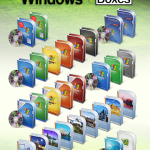 As Windows XP’s decade-long life comes to an end on April 8, 2014, businesses are now faced with a serious decision. Should they upgrade their operating systems with Windows 7, which will face the same end of life in 2020? Or should they take on the challenging task of learning Windows 8.1? While these two options may seem like the only choices for consumers, businesses are actually weighing other options, thanks to cloud technology. Virtual Desktop Infrastructure (VDI) has been touted as the future of the workplace, replacing the neeed to purchase and support multiple installations of software on multiple PCs and mobile devices.
As Windows XP’s decade-long life comes to an end on April 8, 2014, businesses are now faced with a serious decision. Should they upgrade their operating systems with Windows 7, which will face the same end of life in 2020? Or should they take on the challenging task of learning Windows 8.1? While these two options may seem like the only choices for consumers, businesses are actually weighing other options, thanks to cloud technology. Virtual Desktop Infrastructure (VDI) has been touted as the future of the workplace, replacing the neeed to purchase and support multiple installations of software on multiple PCs and mobile devices.
Windows XP Still Prevalent
With only weeks remaining before security patches are no longer available for Windows XP, the operating system still resides on a large chunk of PCs worldwide. According to USA Today, Windows XP still held 29.2 percent of the market as of January 2014. Compare this to the measly 10.6 percent market share held by Windows 8 and 8.1 together and Microsoft’s concern is understandable. Windows 7 is more popular than both XP and 8, consuming 47.5 percent of the market. By now, many professionals have heard the negative commentary about Windows 8 and 8.1, especially in a workplace environment. While mobile device use is growing in the corporate world, the vast majority of workers are still conducting daily work using a desktop or laptop, whether from home or in a traditional office setting. Windows 8’s tablet-friendly features have left some businesses waiting to upgrade until a more work-friendly version of the operating system is unveiled.
Image license: Creative Commons image source

Trending Toward VDI
In light of the approaching end of Windows XP, businesses have a major decision to make. Some may choose to stay with XP a while longer and take the risk that comes from vulnerabilities. But many businesses are already seeing problems with running an outdated operating system, especially when it comes to purchasing new equipment or software designed to work specifically with Windows 7 or newer operating systems. Instead of dealing with purchasing new equipment or upgrading to Windows 8.1, a large segment of the corporate market is taking a serious look at VDI, according to a study from Evolve IP. After asking 1,000 decision-makers about their plans to deal with the end of XP support, Evolve IP found that 17.5 percent of respondents are considering VDI for the first time because of the end of Windows XP support. Another 64.5 percent of respondents state that they plan to incorporate VDI at least partially into the replacement option they choose.
Benefits of VDI
The end of Windows XP may be an inciting factor, but there are other reasons your business could benefit from choosing VDI over a standalone operating system. When a service like Amazon Workspaces or Cisco Desktop Virtualization is implemented in a workplace, users’ desktops move to the cloud. This means that no matter what device they use, they’ll be able to get to their shortcuts, software, and hardware by entering a username and password. One of the biggest benefits to VDI, however, is that it removes the burden of mundane activities from IT staff. Those professionals are now allowed to focus their attentions on growing the organization, rather than reinstalling a piece of software or helping a user restore a file from backup. The productivity boost that comes from this is a huge cost savings for businesses.
Author: Kirill Bensonoff is a founding partner at ComputerSupport.com, helping small business executives get the most out of their technology investment.